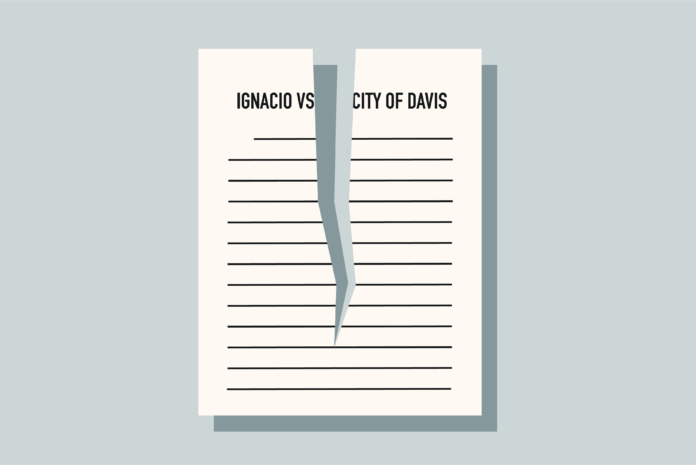Developer of Davis senior housing project questions whether campaign funding laws were violated
A lawsuit levied against the City of Davis and developers of the West Davis Active Adult Community that accused the two parties of housing discrimination was dismissed without prejudice in January. WDAAC developer David Taormino is now questioning whether the lawsuit constituted a violation of campaign finance laws, and is considering pursuing legal action.
According to a news bulletin on the City of Davis website, the case was dismissed on Jan. 18 by U.S. District Court Judge Morrison England, Jr. The defendants, including the City of Davis and Taormino, filed a motion to dismiss the case in response to the suit, and the plaintiff agreed to a dismissal without prejudice — meaning that the plaintiff or other interested parties could still file a similar case in the future if they so choose.
Council members celebrated the dismissal in the Jan. 25 post, expressing satisfaction that construction of the WDAAC can now go ahead as planned.
“Our city has acted on numerous proposals that enhance the local economy, and help increase housing opportunities for our community,” said Councilmember Dan Carson. “Unfortunately, several of these projects have had lawsuits filed against them delaying their benefit to the greater community. I am pleased to see that this lawsuit was dismissed by the court.”
Mayor Brett Lee also expressed his satisfaction with the outcome of the case.
“This project went through a very thorough public process inclusive of a Measure R vote — I am pleased to see the will of City Council and the majority of Davis voters is being upheld without unnecessary delay,” Lee said.
The suit, Ignacio v. The City of Davis, et al. was initially brought against the city in the run-up to the November 2018 election, when voters approved the project under ballot Measure L. Civil rights attorney Mark Merin filed the case on behalf of Samuel Ignacio, a Sacramento resident of Filipino and Hispanic heritage. Merin’s case argued that one of the WDAAC’s provisions — informally called “Taking Care of Our Own” — constituted de facto housing discrimination under the Federal Fair Housing Act. Under the Taking Care of Our Own provision, 90 percent of the new homes proposed by the project would be reserved for Davis residents, those with close relationships to Davis residents or those who have worked in Davis. Because the Davis community is “predominately white,” Merin argued, the policy was inherently discriminatory against non-white buyers.
“The result of this ‘local resident’ restriction, as alleged in the civil rights complaint, is the continuation of a racially imbalanced community and the exclusion of minority would-be purchasers in violation of the Federal Fair Housing Act,” Merin said in a press release posted by the Davisite, a blog run by Davis community members.
But judging from court documents, Taormino said, it appears Merin dropped Ignacio as a client on Dec. 6 without offering explanation. A second lawyer, John F. McIntyre of San Jose, took up Ignacio’s case. A little over a month later, however, the plaintiff camp agreed to dismiss the case after reviewing documents submitted by Taormino and the other defendants.
“The second lawyer got our documents that were filed with the court, and reviewed them and indicated that our points and our authorities were well-considered and well-taken, and […] his client — fully aware of the situation — decided to drop the lawsuit,” Taormino said.
Taormino went on to call the lawsuit a “political ploy” intended to influence the outcome of the Measure L vote, as well as a misuse of the court systems. Furthermore, Taormino said, if the lawsuit was an intentional tactic meant to influence the election results, the opposition would have been required by law to list attorney funds as a campaign expense. Taormino said that Merin disclosed to his attorney that he had received $20,000 dollars to represent Ignacio.
“The opposition, when they filed their forms, made no reference whatsoever to any money going to Mr. Merin or anybody else,” Taormino said. “Mr. Ignacio, we know, does not have the wherewithal to come up the fund to pay an attorney $20,000 […] The law says we’re not going to stop you from doing that, but you got to disclose where the money came from to pay for that type for thing.”
The California Aggie reached out to Alan Pryor, who acted as treasurer of the No on L campaign, but did not receive a response before the time of publication. Taormino expressed some interest in pursuing legal action to investigate whether campaign laws were violated.
“We are considering an appropriate legal response,” Taormino said. “If you don’t stop people from filing frivolous lawsuits by doing nothing, you essentially endorse their type of politics […] I think we should have a reasonable and higher standard for the quality of election rhetoric.”
Written by: Tim Lalonde — city@theaggie.org



